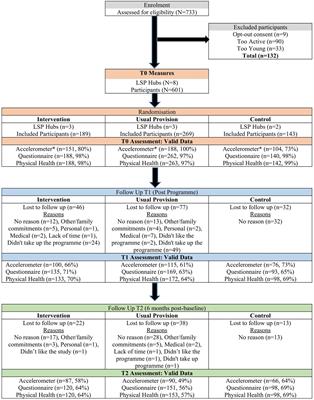Move for Life an intervention for inactive adults aged 50 years and older: A cluster randomised feasibility trial

Background: Move for Life (MFL) is a theory-informed intervention that was developed to augment established physical activity (PA) programmes and enable inactive adults aged 50 years and older to more active. This study examined the feasibility of MFL and sought to provide evidence of its potential for improving PA and associated health outcomes. Methods: A 3-arm cluster randomised feasibility trial compared MFL intervention, usual provision (UP) and control (CON) groups at baseline (T0), post-intervention (T1, at 8, 10 or 12- weeks) and 6-month follow up (T2). We used purposive sampling strategies to recruit participants according to characteristics of interest. Feasibility outcomes assessed recruitment, fidelity, adherence, retention and data completion rates based on pre-set criteria. Primary outcomes were accelerometer-based moderate-to-vigorous intensity PA (MVPA) and self-reported compliance with physical activity guidelines (PAGL). Secondary outcomes included light intensity PA (LiPA), standing time, sedentary time, body composition (adiposity), physical function and psychological well-being. We used linear mixed models (continuous outcomes) or generalized estimated equations (categorical outcomes) to estimate group differences over time in the study outcomes. Results: Progression criteria for feasibility outcomes were met, and 733 individuals were recruited. Considering a 6-month period (T0-T2), while self-reported compliance with PAGL increased in MFL relative to UP and CON and in UP relative to CON, standing time decreased in MFL relative to CON and sedentary time increased in the latter compared to UP. Waist circumference decreased in MFL relative to UP and CON. MFL outperformed UP in the Timed Up and Go Test while MFL and UP increased the distance covered in the Six-Minute Walk Test compared to CON. Psychological well-being increased in MFL relative to CON (all p<.05). Conclusions: Findings show that MFL is feasible, while data are promising with regards to the potential of improving community PA programmes for adults aged 50 or more years. .
Read the full article at the original website
References:
